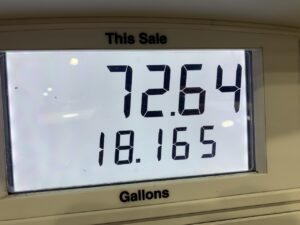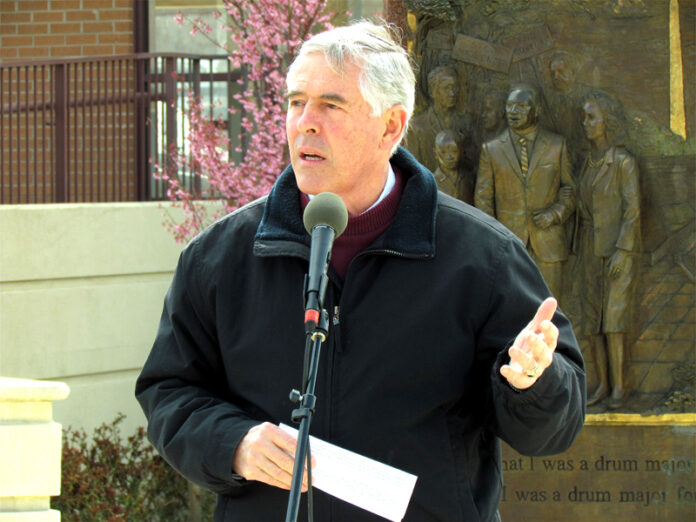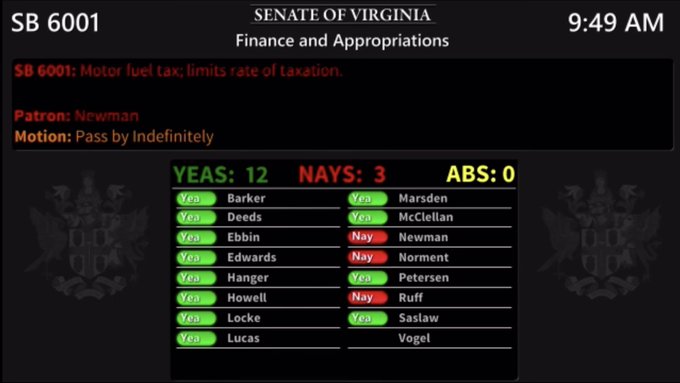Despite gasoline prices soaring at record highs and as reported in The Roanoke Star going up again, the Virginia Senate Finance and Appropriations Committee on April 27 voted to kill the gas tax “holiday” advocated by Gov. Glenn Youngkin (R) and the GOP-led House of Delegates.
Sen. Steve Newman (R), who represents the 23rd district that runs from Lynchburg City to Craig County, sponsored S.B. 6001, the gas tax holiday in the Senate. The proposal would have eliminated the 26.2 cent-per-gallon tax on gas during all of May, June and July, the peak of the summer driving season, then half of the original tax in August, three-fourths in September, and resumed the full gas tax in October.
As seen below, all 11 Democrats on the committee voted to kill the tax relief, as well as one Republican, Sen. Emmet Hanger (Augusta). Sen. John Edwards (D), who represents the sprawling 21st district that goes from Roanoke City to the Giles County border with West Virginia, joined his party colleagues to kill the bill. The Roanoke Star has reached out to Sen. Edwards’ office for a statement for his position on gas tax relief, but no response has been received. Despite the State Senate having a narrow 21-19 Democrat majority, with Lt. Governor Winsome Sears (R) holding a tie-breaking vote, this powerful committee has a lopsided 11-5 Democrat majority.
Responding to the vote, Governor Youngkin’s spokeswoman Macaulay Porter had this statement: “Senate Democrats showed today that they are completely out of touch with Virginians. Refusing to lower gas prices in Virginia is a direct affront to the millions in the Commonwealth who are experiencing an increased cost of living across the board. This is deeply disappointing for all those who expect their elected representatives to work on their behalf, not against it.”
Virginia Democrats have claimed the gas tax break would reduce state funding for crucial projects such as road maintenance, but the governor’s office has countered that the state currently has a huge budget surplus and all construction and maintenance priorities are fully-funded.
Moreover, instead of the Republican’s gas tax “holiday,” Democrats have proposed a $50 rebate per car per Virginian–up to two cars per household–to help offset the unprecedented high prices. However, with the current cost to fill the tank of an SUV hovering around $70, a $50 rebate would be of limited value. Democrats also counter that, if the gas tax were cut across the board, motorists from neighboring states could come into Virginia to gas up and unfairly reap the benefits.
As reported in Potomac Local News, the AAA reports the average cost for a gallon of gas in Virginia is about $3.97 and in about a dozen localities, the cost is more than $4. Although the cost is slightly lower than it was a month ago, it is still about $1.26 higher than it was at the same time last year.

A vehicle with a 12-gallon gas tank costs more than $47.50 to fill up and a vehicle with a vehicle with a 15 gallon gas tank costs about $59.50 to fill up. Last year, it cost about $32.50 to fill up a 12-gallon gas tank and slightly more than $40.50 to fill up a 15 gallon tank.
As reported in The Roanoke Star on April 11, Maryland, Connecticut, and Georgia have already seen bipartisan votes to reduce their states’ gas taxes, which resulted in immediately lower prices at the pump.
In addition to the standstill on gas tax relief, the General Assembly has not yet fulfilled its responsibility to create a budget. On this issue as well, The Roanoke Star reached out to the office of Sen. John Edwards for a statement, but no response has been received.
On April 22, Del. Chris Head (R-Botetourt/Roanoke) released this statement to The Roanoke Star about the still-unresolved budget impasse: “I haven’t received an update in a few days. But I’m optimistic that something will be happening before too long because the longer we wait, the more pressure is unnecessarily placed on our school systems and our localities.”
-Scott Dreyer


